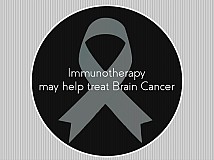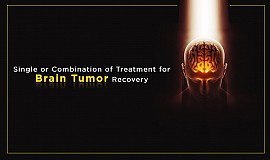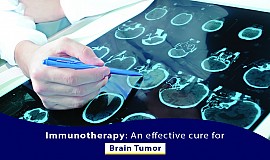Brain Tumor Overview
Despite popular belief, there is no one form of brain tumor, and not all brain tumors are cancerous. Cancerous tumors are malignant in nature. They grow rapidly and aggressively, and can also spread to other parts of the body. On the other hand, tumors that do not invade other healthy tissues of the body are called benign tumors. Benign tumors do not present the same risks as malignant tumors, but they can still impair the brain's normal functioning.
In itself, our brain houses different kinds of cells, making up different tissues. In terms of primary brain cancers, one type of cell deviates from its normal functioning and transforms itself to reproduce rapidly. This rapid growth leads to formation of a tumor.
Such tumors, which originate in the brain are called primary brain tumors. Whereas, metastatic brain tumors are caused due to a process called metastasis, in which cancer cells travel to the brain through blood vessels or lymph vessels from other parts of the body that are infected with cancer.
Physical, Emotional, and Social Effects of a Brain Tumor:
Being diagnosed with a brain tumor is stressful to say the least. It leads to emotional and physical implications that can affect a person’s personal life. Many people find it difficult to even discuss the diagnosis with their family and friends, but one should always realise that an honest and open conversation, and expressing feelings and concerns, is an essential step towards getting the right help.
At Cancer Healer Center we provide our patients with support at each and every step of the way. Our health care team has years of experience and specialises in providing care for the patient, and their families. With quality treatment and palliative care, we ensure that our patients are comfortable and can enjoy a pain free life.
What are some of the possible risks or complications that can lead to Brain tumor?
Brain tumor can potentially lead to a number of medical complications, which makes it very hard to treat effectively. These complications can be mild, or in some instances, life altering. Thus treating such tumors requires specialized tools and procedures.
Our body spends the most amount of energy in maintaining its temperature, and fighting off diseases. Same is also true in the case of a brain tumor. Our body constantly fights off cancer cells and that in turn may make the cancer patient feel lethargic.
Almost 50% of the people who are diagnosed with a brain tumor complain about chronic headaches. This is because the tumor grows out of proportions, and puts pressure on the nearby nerves and blood vessels.
There are many factors which can single handedly, or collectively, lead to abnormalities in cellular functions of the body. These factors can also lead to the formation of cancerous tumors. Some of the factors that can lead to formation of brain tumor are:
- Age: People can get brain tumours at any age. However, with increase in age the risk of Brain Tumors increases.
- Exposure to radiation: Exposure to Radiotherapy, CT Scans, X-rays etc. are known to increase the risk of brain tumours called Meningiomas, and to some extent for Gliomas.
- People who have had cancer as a child and people who had Leukaemia and non Hodgkin lymphoma as an adult have a higher risk of developing a Brain Tumor later in life.
- People with HIV or AIDS have around double the risk of being diagnosed with a Brain Tumor compared to the general population.
- Obesity: Being overweight (having a larger waist size or greater body mass index – BMI) makes people susceptible to a slightly higher risk of meningioma. But being overweight doesn't seem to affect glioma risk.
- Other possible risk factors include: Mobile phones, alcohol, power lines and hair dyes.
Prevention
- Avoid toxic chemicals which is used in the oil and rubber industries
- Avoid excess imaging scan radiations
- The use of cell phones should be reduced as the rays can increase the risk of cancer. Though there is still research going on in this field but precaution is always better.
- Maintaining a healthy lifestyle by including fruits and vegetables and avoiding excess alcohol
- Sexually transmitted diseases like HPV and HIV are linked to increased risk of brain cancer, therefore it is advised that people should practise safe sex.
What are the signs and symptoms of a Brain Tumor?
Brain tumor can lead to a number of distinct signs and symptoms like the following:
- Tumors in the frontal lobe of the brain can lead to weakness and lack of ability to move on one side of the body (paralysis), mood disturbances, difficulty in thinking, confusion and disorientation, and emotional mood swings.
- Parietal lobe tumors can lead to seizures, lack of feeling or paralysis, failure to perform simple mathematical problems, trouble with certain movements, and loss of sense of touch.
- Tumors in the occipital lobe can lead to loss of vision in half of each visual field and visual hallucinations.
- Temporal lobe tumors may lead to seizures, perceptual and spatial disturbances, and failure to understand simple commands (receptive aphasia)
- Tumor in the cerebellum may cause people to have difficulty maintaining their balance (ataxia), headaches, and vomiting.
- Tumors in the hypothalamus may lead to emotional changes, and variation in the perception of hot and cold.
Diagnosis
A timely diagnosis can significantly improve the chances of treating brain tumors, which in turn increases the patient' chances of survival. An early diagnosis gives the doctor enough time to properly treat the patient, and it also facilitates ample time for the patient to recover from the treatment.
After the physical examination (checking the breast, stomach, skin, etc.), which is used to find if the cancer has spread from other parts of the brain, following tests can be done to check the presence, and progression of cancer cells in the body:-
- Neurological tests: Tests like vision test, reflex test, touch sensation, etc, are performed to test the nervous system to find if any abnormalities in the person’s normal functioning.
- Blood tests: Tumors like pineal region tumors or germ cell tumors changes the level of hormones which can be detected by blood tests.
- Imaging tests: Tests like an MRI, a CT scan, or a PET may be used to visualise the activities of a brain to help detect the presence of tumors.
- Biopsy: While operating to remove a brain tumor, the doctor may collect some part of the tumor to test it under a microscope to further find out any cellular abnormalities.
Stages of Brain Tumor
Stages of brain cancer are set according to the pathological features of the cancer cells in the patient’s body. The World Health Organisation has developed a grading system which is used for grading the progression of brain cancer in a patient’s body, and instead of stages it uses grades to signify the progression.
- Grade 1 brain tumors are generally non-cancerous, or grow at a very slow rate. Also, the tumor’s cells appear identical to normal cells when observed under the microscope.
- Grade 2 brain tumor is cancerous, but is growing at a very slow rate. Under the microscope the tumor’s cells appear abnormal, and there is a chance that the tumor may spread to the nearby healthy tissues. Also, these forms of tumors may come back after the initial treatment, hence it is recommended that the patient stays in touch with the medical team.
- Grade 3 brain tumor is cancerous, and is growing at a faster rate than brain tumors in Grade 1 and 2. Under the microscope, the tumor shows significant abnormalities, and actively reproduces cells that may spread to the nearby healthy cells.
- Grade 4 brain tumors grow rapidly, and have a number of distinct abnormalities that are more than apparent when they are observed under a microscope. Also, these cancerous tumors often spread out to different parts of the brain and may even start to support their growth via their own blood vessels. Under grade 4 the brain tumors sometimes also house clusters of dead cells (necrosis) in the core. Glioblastoma or Glioblastoma multiforme (GBM) are the most aggressive and infiltrative forms of Grade 4 brain tumor. GBM does not spread to other parts of the body, but does spread very quickly inside the brain.
Remission, and Recurrent Brain Tumor:
After undergoing the treatment for brain tumor, the patient may enter a state of remission, which means that the tumor can no longer be detected via diagnostic scans. Remission can be temporary or permanent.
There is a chance that the cancer may come back after the initial treatment. This is because cancerous cells infiltrate nearby healthy cells, making it much more difficult to get rid of them completely. In case the tumor returns after the success of initial treatment, it is called recurrent tumor.
Generally, recurrent tumors come back to the place of origin, but in some rare instances they are detected in other places and are treated accordingly.
Treating Brain Cancer and Brain Tumor Using Immunotherapy:
Immune system is the first line of defence when it comes to fighting illnesses. It comprises of white blood cells, organs and numerous tissues of the lymphatic system. At Cancer Healer Center we specialise in treating all forms of cancer, including brain cancer, with our unique and proven take on Immunotherapy, called Cancer Healer Therapy.
Immunotherapy has redefined how cancer is treated throughout the world. Its main focus is towards conditioning the patient’s immune system in a way that can get rid of cancer on it’s own. It may also help patients to stay cancer free after going into remission, by stopping any new cancer growth before it is developed into tumors.
Treatment for brain tumors ultimately depends on its type, its grade, size and location in the brain. Conventionally, the brain tumours are treated through options like surgery, radiation therapy and chemotherapy.
At Cancer Healer Center, we provide medications which are safe to take, and do not cause any undue side effects. After a thorough medical analysis our cancer experts will lay down a road map for your treatment, and will suggest the best course of action according to your particular case.
Our non-intrusive medicines can also be given to patients who have already undergone surgery, to prevent further growth of cancerous tumor, or to prevent the chances of tumor’s recurrence. For many years, we have provided successful cancer treatment, which has been effective even in advanced stages of cancer.
With the help of state-of-the-art facilities, and leading-edge cancer treating procedures, our dedicated specialists provide treatments for all forms of cancer, making Cancer Healer Center one of the best cancer hospitals in India.
For more information about cancer treatment and brain tumor surgery cost in India, contact us now, and book your appointment.
My father Rajiv Kr Jain was diagnosed with Well differentiated Squamous Cell carcinoma in July 2017 (margins were free of tumor). we started the medicine before the surgery, it helped to cope up with the side effects of surgery. Subsequently, second surgery was done for neck dissection. My father followed and took the medicines religiously and with faith. He is doing fine. The staff and...
Cancer is a frustrating and very tough disease. But Dr. Tarang Krishna, a skilled & talented oncologist treated my uncle who was suffering from brain cancer. With IMMUNOTHERAPY treatment he is recovering every day. Together with him, his team is also supportive & ready to listen every problem of the patient. I can say that my uncle is greatly satisfied with the treatment.
I was losing hope, when I was diagnosed with a brain tumour. It was at that time one of my friends suggested me to go for Cancer Healer and honestly, only through oral medicines, I started to recover and feeling improvement in my condition. Thanks to Dr. Tarang Krishna. Even I must say, IMMUNOTHERAPY treatment cost is comparatively affordable than another well-known hospital.






